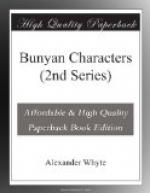MR. BRISK
“Be ye not unequally yoked.”—Paul.
There were some severe precisians in John Bunyan’s day who took the objection to the author of the Pilgrim’s Progress that he sometimes laughed too loud.
“One may (I think) say, both
he laughs and cries,
May well be guessed at by his watery
eyes.
Some things are of that nature as
to make
One’s fancy chuckle while
his heart doth ake.
When Jacob saw his Rachel with the
sheep,
At the same time he did both laugh
and weep.”
And even Dr. Cheever, in his excellent lectures on the Pilgrim’s Progress, confesses that though the Second Part never ceases for a moment to tell the serious story of the Pilgrimage, at the same time, it sometimes becomes so merry as almost to pass over into absolute comedy. “There is one passage,” says Cheever, “which for exquisite humour, quiet satire, and naturalness in the development of character is scarcely surpassed in the language. It is the account of the courtship between Mr. Brisk and Mercy which took place at the House Beautiful.”
Now, the insertion of such an episode as that of Mr. Brisk into such a book as the Pilgrim’s Progress is only yet another proof of the health, the strength, and the truth to nature of John Bunyan’s mind. His was eminently an honest, straightforward, manly, English understanding. A smaller man would not have ventured on Mr. Brisk in such a book as the Pilgrim’s Progress. But there is no affectation, there is no prudery, there is no superiority to nature in John Bunyan. He knew quite well that of the thousands of men and women who were reading his Pilgrim there was no subject, not even religion itself, that was taking up half so much of their thoughts as just love-making and marriage. And, like the wise man and the true teacher he was, he here points out to all his readers how well true religion and the fullest satisfaction of the warmest and the most universal of human affections can be both harmonised and made mutually helpful. In Bunyan’s day love was too much left to the playwrights, just as in our day it is too much left to the poets and the novelists. And thus it is that in too many instances affection and passion have taken full possession of the hearts and the lives of our young people before any moral or religious lesson on these all-important subjects has been given to them: any lesson such as John Bunyan so winningly and so beautifully gives here. “This incident,” says Thomas Scott, “is very properly introduced, and it is replete with instruction.”




